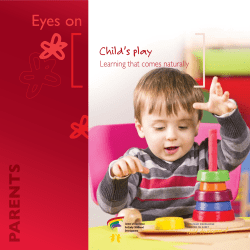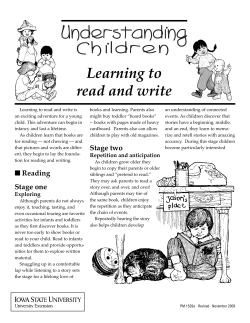
The Imaginary Friend JUNIORS
JUNIORS The Imaginary Friend MH explores why children invent imaginary friends and what purposes these fantasy figures serve for the developing child. Here are some tips on how best to respond to your child’s relationship with their imaginary friends. WORDS DR NICOLA DAVIES A ccording to psychology Professor Truth: Imaginary friends are usually a sign that the Marjorie Taylor, at least 65 per cent youngster is having fun and being imaginative. of children younger than seven invent imaginary friends. These friends can imaginary friends and assures parents that In some instances, these imagined companions children don’t invent imaginary friends because become part of the home environment for years, they have social or emotional problems. Instead, while others get replaced by new ones after a her research shows that children who have few weeks. imaginary friends are generally better at social Why do Children Invent Imaginary Friends? 70 Taylor conducted research on childhood be invisible or take the form of a stuffed toy or doll. relationships than those without imaginary companions. These children laugh and smile more, are more outgoing, and have more real-life Imaginary friends are the result of a child’s naturally friends. They are also more able to see things curious and creative mind. They usually come into from another child’s perspective. Contrary being during a child’s preschool years, when the to conventional misconceptions, your child’s little one starts to engage in more complex types invented companion is actually a sign of an active, of pretend play. Before delving into the benefits healthy imagination. of creating imaginary friends, let’s consider two Myth: Only children who confuse reality and common myths: fantasy have imaginary friends. Myth: Imaginary friends are a sign your child has Truth: Children with imaginary friends know they emotional problems. aren’t real. | July 2014 TheImaginaryFriend july14(1).indd 70 16/6/14 10:39 am It’s not unusual for children to get emotionally caught up in their pretend play with imaginary friends, but this doesn’t mean they have lost touch with reality. It is similar to the experience adults have when they become intensely emotionally involved with events or characters in movies or books. Children know their invented friends aren’t real, even when they adamantly state their imaginary friend sometimes misbehaves, doesn’t always want to share things, or talks too much! Indeed, this is behaviour that they may be experiencing from their peers or siblings and are using their imaginary friends to find the best way to cope. The Benefits of Imaginary Friends Children create imaginary companions because they benefit from these fantasies in a number of ways: Pretend play Maturing preschoolers take part in pretend play as a normal and healthy part of development. It gives them an opportunity to rehearse and try out social roles they see in the world around them. It also provides them with a safe environment to work through and process the many emotions they experience on a daily basis. A child may adopt the role of an authority figure by making demands on their imaginary friend. How the imaginary friend responds can be a source of insight into how your child relates to and understands issues about control, authority, and possibly conflict. Pretend play is a fun and imaginative tool children use to to imaginary friends during these events and this make sense of the world and their place in it. It’s intensified relationship is often a sign that your also a means through which they can express their child needs to be reassured in some way. developing understanding, thoughts, and feelings about events in their lives. Increased control Your child has total control over their companion, Emotional support unlike with real childhood friends. For this Children often invent imaginary friends to help reason, your child’s imaginary friend presents the them process challenging emotions or cope with little one with a safe opportunity to compensate traumatic experiences. During pretend play it’s for the feelings of powerlessness they can not uncommon for a child to place their imaginary experience in the world of adults. Adults companion in an uncertain or anxiety-provoking dominate children’s lives at home, at school, and situation, and then to take care of them through on the playground. With imaginary friends always soothing, empathic reassurance. Imaginary friends available your child is the one making all the are great companions to help children deal with the decisions for a change and gets to determine anxieties and uncertainties of life, such as when what they will be doing, when, for how long, and the family moves, or when children have to enter who should and shouldn’t be invited. The sense a new school environment. Other scenarios can of power, control, and competence children include the arrival of a new baby or when parents experience in these fictitious relationships are get divorced. Children can become more attached crucial for their social development. July 2014 | TheImaginaryFriend july14(1).indd 71 71 16/6/14 10:39 am JUNIORS Social and emotional development child insists that their invisible companion Social psychologist Susan Newman refers is to blame. In such instances, ask both of to research which shows that children with them to clean up and suggest that both take imaginary companions automatically stimulate responsibility for keeping their space clean. their own social and emotional growth. They tend to have broader, richer and better Respect your child’s inventions and don’t vocabularies – developed through talk with try to take over, unless you have good their invented companions. They are also less reasons for interfering. You can, on bored and know how to entertain themselves occasion, ask about the imaginary friend, when other playmates aren’t around. Research or attempt to talk to them in your child’s suggests there is a degree of maturity in their presence. However, allow your child to play when compared with classmates who have be in charge of the relationship with the no invented companions. fantasy friend. Undue interference from your side might spark conflict, anger, or Cognitive development provoke unnecessary power struggles Children with imaginary friends engage in self- with your child. talk, which develops their cognitive abilities. Self-talk precedes and encourages internalised Don’t worry when imaginary friends thought, which is a crucial cognitive component share your child’s life for a while. It’s necessary for problem-solving and other critical not uncommon for these make-believe thinking skills. This means that children, through companions to hang around for at least pretend play and talking with imaginary friends, three years before they disappear. Some develop these skills faster than children who children beyond pre-school age keep one don’t play with imagined friends. Self-talk or two around just for fun. When your child eventually develops into silent thought, which is ready to say goodbye to their imaginary underlies and strengthens the child’s ability to friends, they will do so, engage in more complex cognitive tasks. How to Relate to Your Child with an Imaginary Friend Your child might involve you in doing things for their imaginary friend such as setting the table for them or holding the door open Try not to worry unnecessarily when your child for them. It’s a good idea to play along, but spends time with an imaginary friend. Here are instead of doing things for the imaginary some tips on how to relate to your child with friend, encourage your child to do these their imaginary companion: things themselves. This is one way of developing your little one’s social skills in a Relax and enjoy the experience. You will be way that’s fun and engaging. surprised how much you can find out about your little one’s interests and concerns when If your child completely avoids interaction you ask questions about their relationship with real friends and exclusively plays with with their imaginary friend. his imaginary friends, then it may be cause for concern. In this instance it is best to seek Don’t discourage your child’s pretend professional counsel because the chances play, but do observe it. If the fabricated are high that underlying emotional issues are relationship becomes disruptive in the getting the better of your child. home or threatens your child’s safety then you should set limits. For example, if the 72 If your child is happy and interacts with imaginary friend gets blamed for making his peers then there is no need to worry. The a mess, encourage your child to take best thing you can do for your child is to pay responsibility for it. Try to not bring the attention to their play and enjoy the glimpses imaginary friend into the picture unless your they allow you into their fantasy world. | July 2014 TheImaginaryFriend july14(1).indd 72 16/6/14 10:39 am
© Copyright 2025













